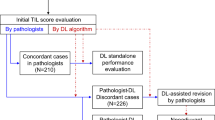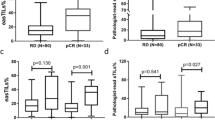Abstract
Background
Only a subset of gastric cancer (GC) patients with stage II–III benefits from chemotherapy after surgery. Tumour infiltrating lymphocytes per area (TIL density) has been suggested as a potential predictive biomarker of chemotherapy benefit.
Methods
We quantified TIL density in digital images of haematoxylin-eosin (HE) stained tissue using deep learning in 307 GC patients of the Yonsei Cancer Center (YCC) (193 surgery+adjuvant chemotherapy [S + C], 114 surgery alone [S]) and 629 CLASSIC trial GC patients (325 S + C and 304 S). The relationship between TIL density, disease-free survival (DFS) and clinicopathological variables was analysed.
Results
YCC S patients and CLASSIC S patients with high TIL density had longer DFS than S patients with low TIL density (P = 0.007 and P = 0.013, respectively). Furthermore, CLASSIC patients with low TIL density had longer DFS if treated with S + C compared to S (P = 0.003). No significant relationship of TIL density with other clinicopathological variables was found.
Conclusion
This is the first study to suggest TIL density automatically quantified in routine HE stained tissue sections as a novel, clinically useful biomarker to identify stage II–III GC patients deriving benefit from adjuvant chemotherapy. Validation of our results in a prospective study is warranted.
This is a preview of subscription content, access via your institution
Access options
Subscribe to this journal
Receive 24 print issues and online access
$259.00 per year
only $10.79 per issue
Buy this article
- Purchase on Springer Link
- Instant access to full article PDF
Prices may be subject to local taxes which are calculated during checkout



Similar content being viewed by others
Data availability
The datasets analysed during the current study are available from the corresponding author on reasonable request.
References
Sung H, Ferlay J, Siegel RL, Laversanne M, Soerjomataram I, Jemal A, et al. Global Cancer Statistics 2020: GLOBOCAN estimates of incidence and mortality worldwide for 36 cancers in 185 countries. CA Cancer J Clin. 2021;71:209–49.
Smyth EC, Verheij M, Allum W, Cunningham D, Cervantes A, Arnold D, et al. Gastric cancer: ESMO Clinical Practice Guidelines for diagnosis, treatment and follow-up. Ann Oncol. 2016;27:v38–v49.
Sasako M, Sakuramoto S, Katai H, Kinoshita T, Furukawa H, Yamaguchi T, et al. Five-year outcomes of a randomized phase III trial comparing adjuvant chemotherapy with S-1 versus surgery alone in stage II or III gastric cancer. J Clin Oncol. 2011;29:4387–93.
Noh SH, Park SR, Yang HK, Chung HC, Chung IJ, Kim SW, et al. Adjuvant capecitabine plus oxaliplatin for gastric cancer after D2 gastrectomy (CLASSIC): 5-year follow-up of an open-label, randomised phase 3 trial. Lancet Oncol. 2014;15:1389–96.
Kang YK, Yook JH, Park YK, Lee JS, Kim YW, Kim JY, et al. PRODIGY: a phase III study of neoadjuvant docetaxel, oxaliplatin, and S-1 plus surgery and adjuvant S-1 versus surgery and adjuvant S-1 for resectable advanced gastric cancer. J Clin Oncol. 2021;39:2903–13.
Tsuburaya A, Yoshida K, Kobayashi M, Yoshino S, Takahashi M, Takiguchi N, et al. Sequential paclitaxel followed by tegafur and uracil (UFT) or S-1 versus UFT or S-1 monotherapy as adjuvant chemotherapy for T4a/b gastric cancer (SAMIT): a phase 3 factorial randomised controlled trial. Lancet Oncol. 2014;15:886–93.
Yu J, Gao Y, Chen L, Wu D, Shen Q, Zhao Z, et al. Effect of S-1 plus oxaliplatin compared with fluorouracil, leucovorin plus oxaliplatin as perioperative chemotherapy for locally advanced, resectable gastric cancer: a randomized clinical trial. JAMA Netw Open. 2022;5:e220426.
Zhang X, Liang H, Li Z, Xue Y, Wang Y, Zhou Z, et al. Perioperative or postoperative adjuvant oxaliplatin with S-1 versus adjuvant oxaliplatin with capecitabine in patients with locally advanced gastric or gastro-oesophageal junction adenocarcinoma undergoing D2 gastrectomy (RESOLVE): an open-label, superiority and non-inferiority, phase 3 randomised controlled trial. Lancet Oncol. 2021;22:1081–92.
Cancer Genome Atlas Research Network. Comprehensive molecular characterization of gastric adenocarcinoma. Nature. 2014;513:202–9.
Ho SWT, Tan P. Dissection of gastric cancer heterogeneity for precision oncology. Cancer Sci. 2019;110:3405–14.
Cheong JH, Yang HK, Kim H, Kim WH, Kim YW, Kook MC, et al. Predictive test for chemotherapy response in resectable gastric cancer: a multi-cohort, retrospective analysis. Lancet Oncol. 2018;19:629–38.
Japanese Gastric Cancer, A. Japanese gastric cancer treatment guidelines 2018 (5th edition). Gastric Cancer. 2021;24:1–21.
Muro K, Chung HC, Shankaran V, Geva R, Catenacci D, Gupta S, et al. Pembrolizumab for patients with PD-L1-positive advanced gastric cancer (KEYNOTE-012): a multicentre, open-label, phase 1b trial. Lancet Oncol. 2016;17:717–26.
Salvatore V, Teti G, Focaroli S, Mazzotti MC, Mazzotti A, Falconi M. The tumor microenvironment promotes cancer progression and cell migration. Oncotarget. 2017;8:9608–16.
Tian C, Jing H, Wang C, Wang W, Cui Y, Chen J, et al. Prognostic role of tumour-infiltrating lymphocytes assessed by H&E-stained section in gastric cancer: a systematic review and meta-analysis. BMJ Open. 2021;11:e044163.
Denkert C, von Minckwitz G, Brase JC, Sinn BV, Gade S, Kronenwett R, et al. Tumor-infiltrating lymphocytes and response to neoadjuvant chemotherapy with or without carboplatin in human epidermal growth factor receptor 2-positive and triple-negative primary breast cancers. J Clin Oncol. 2015;33:983–91.
Brambilla E, Le Teuff G, Marguet S, Lantuejoul S, Dunant A, Graziano S, et al. Prognostic effect of tumor lymphocytic infiltration in resectable non-small-cell lung cancer. J Clin Oncol. 2016;34:1223–30.
Huang HS, Su HY, Li PH, Chiang PH, Huang CH, Chen CH, et al. Prognostic impact of tumor infiltrating lymphocytes on patients with metastatic urothelial carcinoma receiving platinum based chemotherapy. Sci Rep. 2018;8:7485.
Shibutani M, Maeda K, Nagahara H, Fukuoka T, Iseki Y, Matsutani S, et al. Tumor-infiltrating lymphocytes predict the chemotherapeutic outcomes in patients with stage IV colorectal cancer. In Vivo. 2018;32:151–8.
Ahn B, Chae YS, Kim CH, Lee Y, Lee JH, Kim JY. Tumor microenvironmental factors have prognostic significances in advanced gastric cancer. APMIS. 2018;126:814–21.
Kim JY, Kim CH, Lee Y, Lee JH, Chae YS. Tumour infiltrating lymphocytes are predictors of lymph node metastasis in early gastric cancers. Pathology. 2017;49:589–95.
Zhang D, He W, Wu C, Tan Y, He Y, Xu B, et al. Scoring system for tumor-infiltrating lymphocytes and its prognostic value for gastric cancer. Front Immunol. 2019;10:71.
Choi YY, Kim H, Shin SJ, Kim HY, Lee J, Yang HK et al. Microsatellite instability and programmed cell death-ligand 1 expression in stage II/III gastric cancer: post hoc analysis of the CLASSIC randomized controlled study. Ann Surg. 2018. https://doi.org/10.1097/SLA.0000000000002803.
Falk T, Mai D, Bensch R, Cicek O, Abdulkadir A, Marrakchi Y, et al. Author Correction: U-Net: deep learning for cell counting, detection, and morphometry. Nat Methods. 2019;16:351.
Board WCoTE. Digestive system tumours. 5th edn. Lyon: International Agency for Research on Cancer; 2019. vol. 1.
Salgado R, Denkert C, Demaria S, Sirtaine N, Klauschen F, Pruneri G, et al. The evaluation of tumor-infiltrating lymphocytes (TILs) in breast cancer: recommendations by an International TILs Working Group 2014. Ann Oncol. 2015;26:259–71.
Cancer AJCo. AJCC Cancer Staging Manual. New York: Springer New York; 2002.
International Union Against Cancer. TNM Classification of Malignant Tumours. 6th edn. New York: Wiley-Liss; 2002.
Sobin LH, Gospodarowicz M, Wittekind C. International Union against Cancer. In: TNM classification of malignant tumours 7th edn. Wiley-Blackwell; 2009.
Royston P, Sauerbrei W. Two techniques for investigating interactions between treatment and continuous covariates in clinical trials. Stata J. 2009;9:230–51.
Mouabbi JA, Chand M, Asghar IA, Sakhi R, Ockner D, Dul CL, et al. Lumpectomy followed by radiation improves survival in HER2 positive and triple-negative breast cancer with high tumor-infiltrating lymphocytes compared to mastectomy alone. Cancer Med. 2021;10:4790–5.
Lee JS, Won HS, Sun S, Hong JH, Ko YH. Prognostic role of tumor-infiltrating lymphocytes in gastric cancer: A systematic review and meta-analysis. Medicine (Baltim). 2018;97:e11769.
Yu PC, Long D, Liao CC, Zhang S. Association between density of tumor-infiltrating lymphocytes and prognoses of patients with gastric cancer. Medicine (Baltim). 2018;97:e11387.
Cheng N, Li P, Cheng H, Zhao X, Dong M, Zhang Y, et al. Prognostic value of tumor-infiltrating lymphocytes and tertiary lymphoid structures in epstein-barr virus-associated and -negative gastric carcinoma. Front Immunol. 2021;12:692859.
Kang BW, Seo AN, Yoon S, Bae HI, Jeon SW, Kwon OK, et al. Prognostic value of tumor-infiltrating lymphocytes in Epstein-Barr virus-associated gastric cancer. Ann Oncol. 2016;27:494–501.
Lin SJ, Gagnon-Bartsch JA, Tan IB, Earle S, Ruff L, Pettinger K, et al. Signatures of tumour immunity distinguish Asian and non-Asian gastric adenocarcinomas. Gut. 2015;64:1721–31.
Hendry S, Salgado R, Gevaert T, Russell PA, John T, Thapa B, et al. Assessing tumor-infiltrating lymphocytes in solid tumors: a practical review for pathologists and proposal for a standardized method from the International Immuno-Oncology Biomarkers Working Group: Part 2: TILs in melanoma, gastrointestinal tract carcinomas, non-small cell lung carcinoma and mesothelioma, endometrial and ovarian carcinomas, squamous cell carcinoma of the head and neck, genitourinary carcinomas, and primary brain tumors. Adv Anat Pathol. 2017;24:311–35.
Kojima YA, Wang X, Sun H, Compton F, Covinsky M, Zhang S. Reproducible evaluation of tumor-infiltrating lymphocytes (TILs) using the recommendations of International TILs Working Group 2014. Ann Diagn Pathol. 2018;35:77–79.
Acknowledgements
The CLASSIC study investigators who contributed to collect materials from the patients and approved to use for scientific research.
Funding
DRM and HIG are supported in part by the National Institute for Health and Care Research (NIHR) Leeds Biomedical Research Centre. The views expressed are those of the author(s) and not necessarily those of the NHS, the NIHR or the Department of Health and Social Care. J-HC is supported in part by a grant funded by the Ministry of Health & Welfare, Republic of Korea (grant number National Cancer Center HA22C005000).
Author information
Authors and Affiliations
Contributions
HIG and J-HC conceived and designed the study. HIG, J-HC and RL supervised the study. Y-WK, M-CK, HK and J-HC collected the specimens, constructed the TMAs and provided the database. M-CK, LCH and HIG performed the pathological review. JL, VV, YJ, GEF, LHC and DRM set up the image analysis pipeline. HIG and GEF performed the quality control. DHWL, ND, SJ, LCH and VM carried out the statistical analysis. DHWL, NS, HIG, RL, LCH and AFI wrote and revised the manuscript. Y-WK and J-HC provided significant input for the manuscript. LCH, VV and YJ did the computational analysis. All authors had full access to the study data, discussed and reviewed the manuscript, and approved the manuscript for publication.
Corresponding authors
Ethics declarations
Competing interests
DRM is director of HeteroGenius Limited. RL received consulting fees from Astellas, Janssen, Roche, MSD not related to the current study. HIG received consulting fees from AstraZeneca and BMS not related to the current study. The remaining authors declare no competing interests.
Ethics declarations
The study was conducted in compliance with the Declaration of Helsinki and was approved by the Institutional Review Boards of all participating institutions. The local institutional review boards, which waived the need for patient informed consent for this retrospective study.
Additional information
Publisher’s note Springer Nature remains neutral with regard to jurisdictional claims in published maps and institutional affiliations.
Supplementary information
Rights and permissions
Springer Nature or its licensor (e.g. a society or other partner) holds exclusive rights to this article under a publishing agreement with the author(s) or other rightsholder(s); author self-archiving of the accepted manuscript version of this article is solely governed by the terms of such publishing agreement and applicable law.
About this article
Cite this article
Liu, D.H.W., Kim, YW., Sefcovicova, N. et al. Tumour infiltrating lymphocytes and survival after adjuvant chemotherapy in patients with gastric cancer: post-hoc analysis of the CLASSIC trial. Br J Cancer 128, 2318–2325 (2023). https://doi.org/10.1038/s41416-023-02257-3
Received:
Revised:
Accepted:
Published:
Issue Date:
DOI: https://doi.org/10.1038/s41416-023-02257-3



